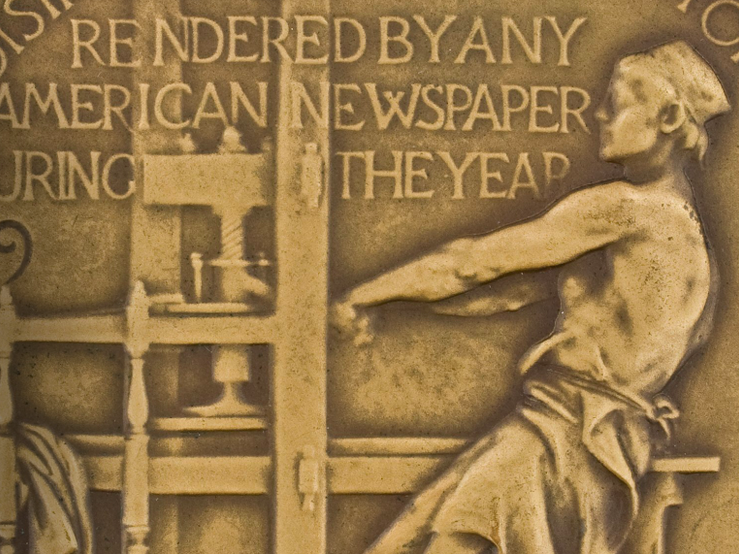The Scoop
The Pulitzer Board, facing a lawsuit from Donald Trump over its Pulitzer Prize for stories on Russian election interference in 2016, based its decision to stand by that reporting on a confidential review — a review that Semafor has learned was written by former Reuters editor-in-chief Stephen Adler.
The New York Times and the Washington Post won a prize in 2018 for coverage of the Russian interference operation and “its connections to the Trump campaign.” In 2022, the now-president elect sued the board after it refused to retract the prize.
Now Adler’s review is at the heart of Trump’s attempt to literally relitigate media coverage of his 2016 election win in an Okeechobee, Florida, court.
The Pulitzer Board had fought to keep Adler’s report and his identity secret, but confirmed his role after Adler disclosed it in response to a question from Semafor.
“The Pulitzer Board takes concerns about the Prizes very seriously. In the case of President-elect Trump’s challenge to the 2018 national reporting prizes, we chose an independent reviewer who is highly respected with impeccable credentials, unimpeachable integrity, and deep familiarity with the Pulitzer Prize standards and history,” the board said in a statement.
Adler was editor-in-chief of Businessweek and spent 16 years at The Wall Street Journal. He would be an obvious figure to conduct such a review because of his longtime focus on journalistic ethics, beginning at the Journal, where he taught a required ethics and standards course. Adler, who also has a degree from Harvard Law School, founded and leads the Ethics and Journalism Initiative at New York University’s Arthur L. Carter Journalism Institute.
Know More
This lawsuit has rattled journalists in part because it is filed against the individual members of the Pulitzer Board, leading figures including New Yorker editor David Remnick, Boston Globe editor Nancy Barnes, and former Los Angeles Times editor Kevin Merida. The board’s lawyers lost a motion to dismiss that was based, in part, on making the case that 19 of the 20 board members had no real ties to Florida and that the venue made little sense.
The sides are currently sparring over whether material obtained in discovery may be kept confidential. In a statement filed with the court, Neil Brown, the president of the Poynter Institute for Media Studies (and the only board member who lives in Florida) raised “the real specter of this litigation being used to inflict irreparable harm on the Pulitzer Prizes and on the Defendants.”
“As a journalist and educator of journalists, I recognize and appreciate, and agree, that the public has a presumptive right of access to many judicial proceedings and court filings,” he said. “But what might ultimately be disclosed in a later official proceeding is a separate question from the proper limitations on public disclosure of confidential testimony and documents exchanged by the parties in pre-trial civil discovery.”
“My concern about potentially abusive discovery is only heightened by Plaintiff Donald Trump’s statements regarding this case,” he added.
The View From the First Amendment Bar
The Florida case raises fascinating questions about journalism, and is one of a number of highly-charged defamation cases in recent years to survive defendants’ early motions to dismiss — a worrying trend for media companies. But leading First Amendment lawyers predicted the suit, based on early rulings by a Florida judge, will not ultimately win out over Constitutional protections for speech and journalism.
“It’s an outlandish theory for a defamation complaint,” said Theodore Boutrous, who represented CNN in a fight to get correspondent Jim Acosta’s press pass back in the first Trump administration. He said that the plaintiffs would ultimately have to prove both that underlying statements in the Post and Times articles that won the prizes were false, and that the board’s 2022 statement standing by its 2017 prize had done Trump additional damage, which he called an “impossible burden.”
“The law requires that in a defamation case you point to the specific statement that you allege was false,” he said. “Everything else there is just bluster.”
Floyd Abrams, another top First Amendment lawyer who represented the Times in the 1971 Pentagon Papers case, among others, called Judge Robert Pegg’s ruling to allow the case to proceed “deeply disturbing” because it would keep organizations from reviewing their own past conduct for fear of being sued. The ruling would “establish a standard which would effectively make it impossible for organizations like the Pulitzer Board to ask people in confidence to pass judgement on a prior award,” Abrams said.
A spokesman for the Trump legal team declined to comment on Adler’s role or the underlying case.
Ben’s view
I find the ideas behind Trump’s lawsuit worth taking seriously. A layman’s translation of the case is that even if stories accurately following the 2017 Russia investigation (which is what I tried to do when I was editing BuzzFeed, and broke the news of the Steele dossier) were solidly reported, a bigger picture never came together. All that reporting, in retrospect, looks more like a wild goose chase, even if we didn’t know it at the time. (This is true, as I wrote last week, of the “collusion” claims but not of Russian meddling per se. Trump’s lawyers quietly rebranded their target the “Russia collusion hoax,” as Russian interference is not in dispute.)
Journalistic prizes, meanwhile, are a double-edged sword for the profession. They represent, on one hand, an attempt to establish high standards and reward success. But they also come with a level of self-importance and secrecy that cuts against the actual work of journalism, a contradiction the Trump case highlights.
The Pulitzer Board’s decision to commission Adler’s report reflects how seriously they took Trump’s claim, even if the decision to commission and cite a confidential review was a technical legal blunder. Adler, a critic of some of the coverage of the era (including mine), is not the guy you bring in for a whitewash. I understand the technical, legal reasons that the Pulitzers are fighting to keep his report secret. But the debate over the Russia coverage is painfully short on careful, disinterested evaluation, and perhaps both Trump and his critics will both benefit from reading the report when it, nearly inevitably, becomes public.
Notable
- The Pulitzer Board chose in 2003 not to revoke the foreign reporting prize awarded in 1932 to the Stalin apologist Walter Duranty for his work in the New York Times. His reporting, they wrote, “falls seriously short” of today’s standards but “there was not clear and convincing evidence of deliberate deception, the relevant standard in this case.” The Times wrote that he took “Soviet propaganda at face value” and, after his Pulitzer, published his most damning work, in which he denied Soviet responsibility for a famine in Ukraine.
- In 1981, the Washington Post’s Janet Cooke returned her Pulitzer Prize based on a story about an 8-year-old heroin addict that she admitted was a “fabrication.”
- Trump’s lawsuits, even if they fail, are a much easier way to “drain companies of time, money, resources” than targeting news outlets with regulation, Axios’ Sara Fischer wrote.


